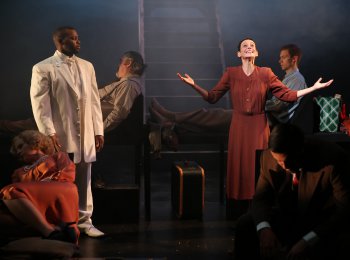A Wilder Christmas
A rare opportunity to see two beautifully staged early Thornton Wilder plays.

Giselle Wolf, Brad Fryman, Barbra Wengerd and John Pasha in a scene from Thornton Wilder’s “The Long Christmas Dinner” (Photo credit: Carol Rosegg)
[avatar user=”Joel Benjamin” size=”96″ align=”left” ] Joel Benjamin, Critic[/avatar]The Peccadillo Theater Company’s A Wilder Christmas is a gentle and genteel evening of theater: two early Thornton Wilder one-act plays, directed with an attention to detail and a leisurely sense of timing by Dan Wackerman, the company’s artistic director. The Long Christmas Dinner (1931) and Pullman Car Hiawatha (1930) together make for a rich sampling of Wilder’s familiar themes of family and the unavoidable specter of death (which, in Wilder, is only the beginning of another journey). These themes were perfected in his 1938 masterpiece, Our Town, including the conceit of a godlike Greek chorus in the form of a Stage Manager who explains and even supervises the action.
The Long Christmas Dinner takes place in the dining room of the Bayard home and begins at Christmas, 1840. Characters enter stage right. It soon becomes apparent that those who exit stage left have passed away. The actors speak in a slightly stilted way and mime all the dining activities: carving the (invisible) turkey, pouring beverages and eating. Keeping the Bayard manse in the family is the subject of much discussion as the different generations enter and exit. Initially, conversation is formal with obeisance paid to Mother Bayard (Victoria Blankenship), the matriarch. When she passes, her son Roderick (James Beaman) and his wife Lucia (Giselle Wolf) take the places of honor at the table. Their children are seen going off to war, getting married, going to school, and changing with the times, keeping the Bayard name alive for ninety years and beyond. Despite the façade of formality, the disquiet and despair are palpable as one by one they depart stage left. Wilder’s lines, helped by Marianne Custer’s excellent costumes (in both plays), agilely define the shift in time from 1840 to 1930.
The more complex play, Pullman Car Hiawatha, takes a cross-section of America on a surreal journey from New York to Chicago in 1930 aboard the eponymous railway carriage. Things turn celestial when a much put-upon Porter morphs into an Archangel to collect the spirit of a character who dies en route.
The set by Harry Feiner, who also designed the exquisitely detailed lighting effects, is a schematic of the Pullman car, with a row of barebones chaise lounges becoming the lower berths upstage. A combination of these chaises and regular chairs arranged downstage indicate the more posh compartments in which an agitated Insane Woman (Giselle Wolf) is being escorted to a sanitarium by a Male and Female Attendant (Rafe Terrizzi and Kristin Parker) and a caring Philip (John Pasha) and his frail wife Harriet (Anna Marie Sell) are journeying to see family in Chicago.

LaMar Giles (white suit) and Giselle Wolf as the Insane Woman in a scene from Thornton Wilder’s “Pullman Car Hiawatha” (Photo credit: Carol Rosegg)
Characters complain about other passengers, share their inner thoughts, scrub the floors (two Scrub women, Merissa Czyz and Barbara Salant) and try valiantly to sleep. Suddenly the Stage Manager takes the play in a different direction, asking audience members to read statistics about passing towns or produce eerie, angelic tones from three metal prayer bowls. (A town called Grover’s Corners is mentioned!) The hours of 10, 11 and 12 o’clock are symbolically embodied by three actresses who parade up and down the aisles. We get weather reports, information about local fauna, and a ghost story about a track worker.
All the theatrical gimmicks—breaking the fourth wall, vocalizing inner thoughts, the shifts in tone—somehow make us care for these very mortal characters and their intimately expressed fears, irritations and musings.
The large cast is uniformly excellent with the Stage Manager of Michael Sean McGuinness standing out for congenially guiding the amateurs in the audience and his commanding way of keeping the events in the Pullman car rolling along.
Together these two short works come in at less than ninety minutes yet require a fairly large cast, making them out of the reach of most commercial theatre groups, so we have to be grateful to the Peccadillo for this very limited run of these two plays whose eternal themes dovetail nicely with the message of the holiday season.
A Wilder Christmas (through January 10, 2016)
Theatre at St. Clement’s, 423 West 46th Street, in Manhattan
For tickets, call 866-811-4111 (OvationTix) or visit http://www.thepeccadillo.com
Running time: 90 minutes including one intermission






Leave a comment